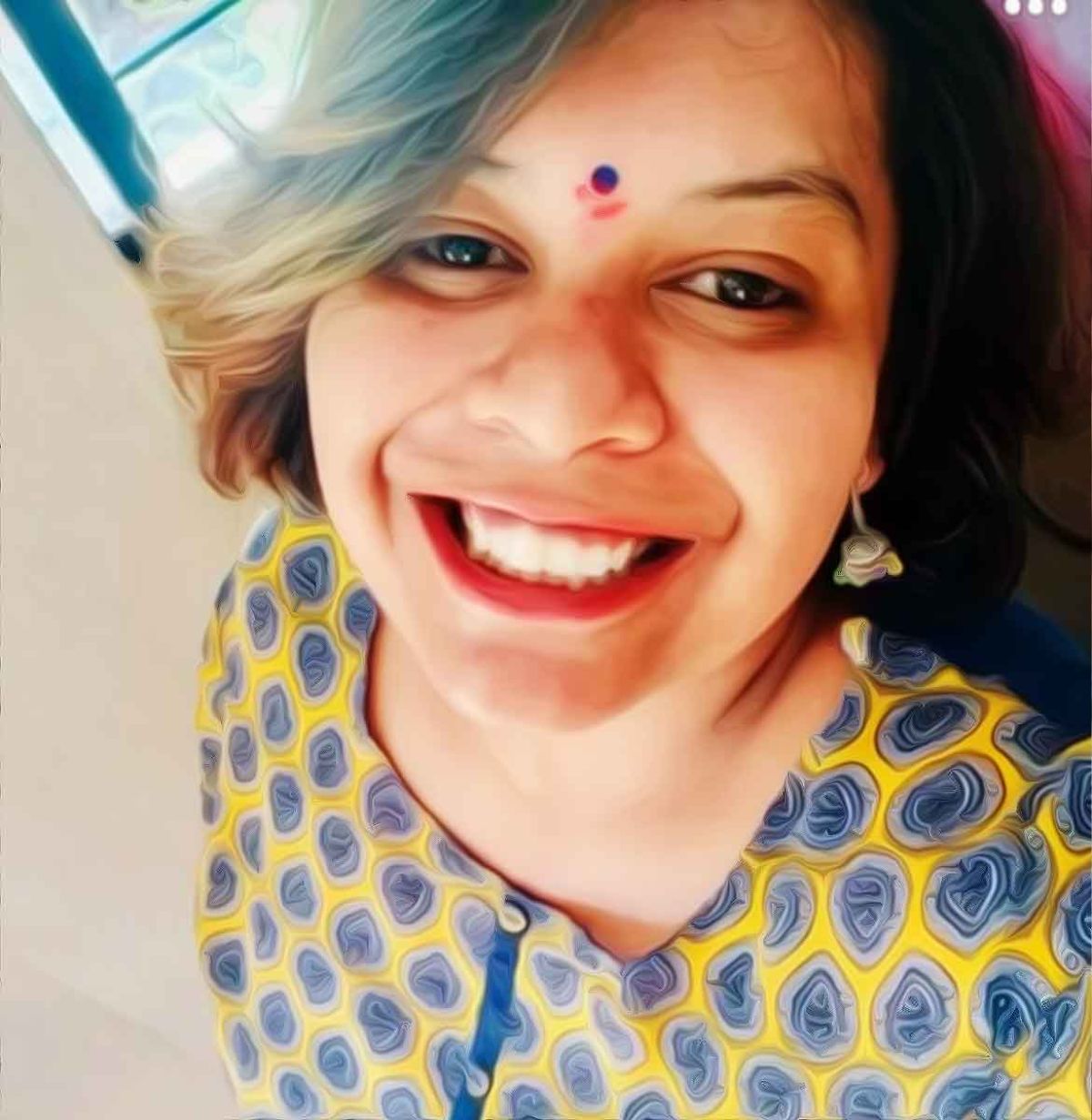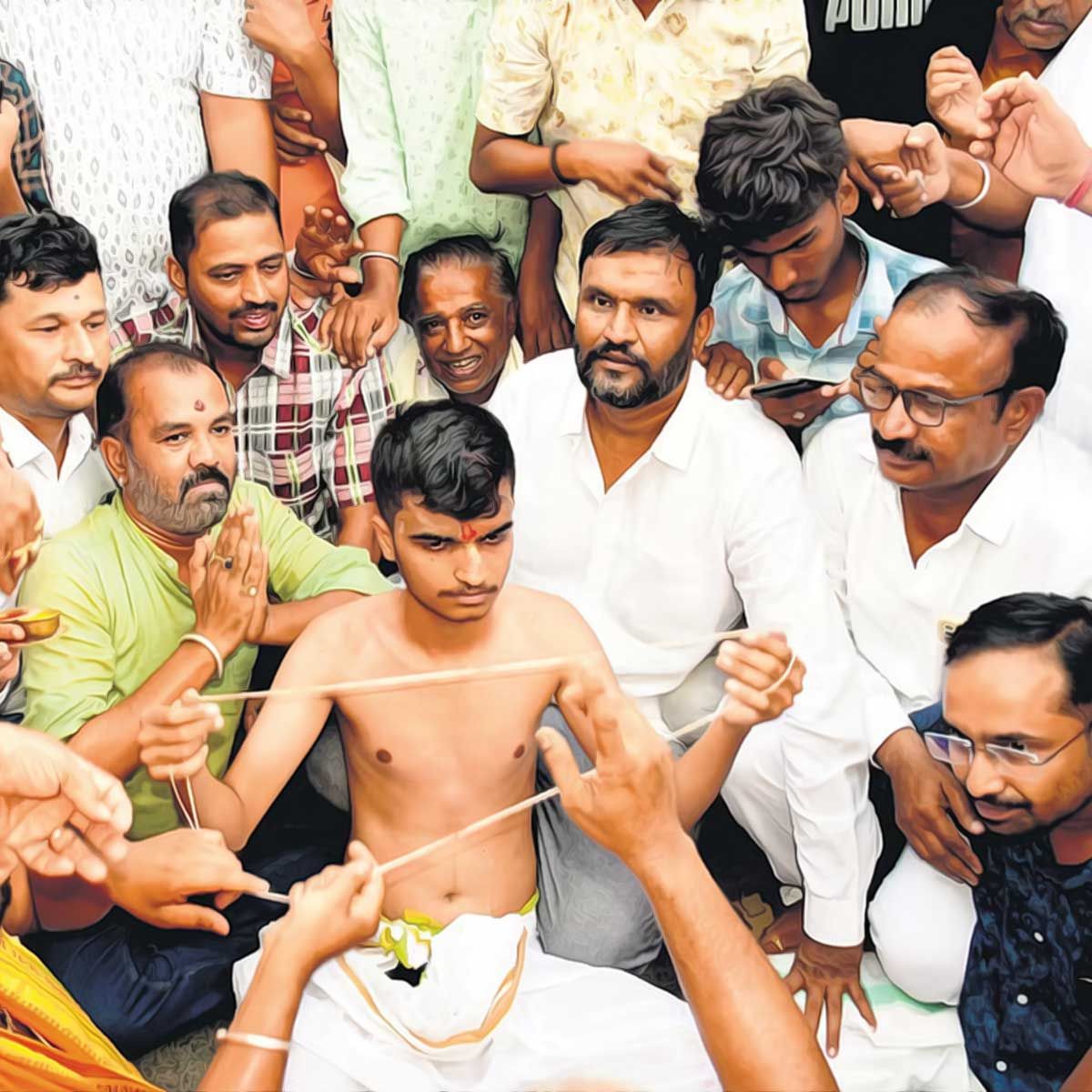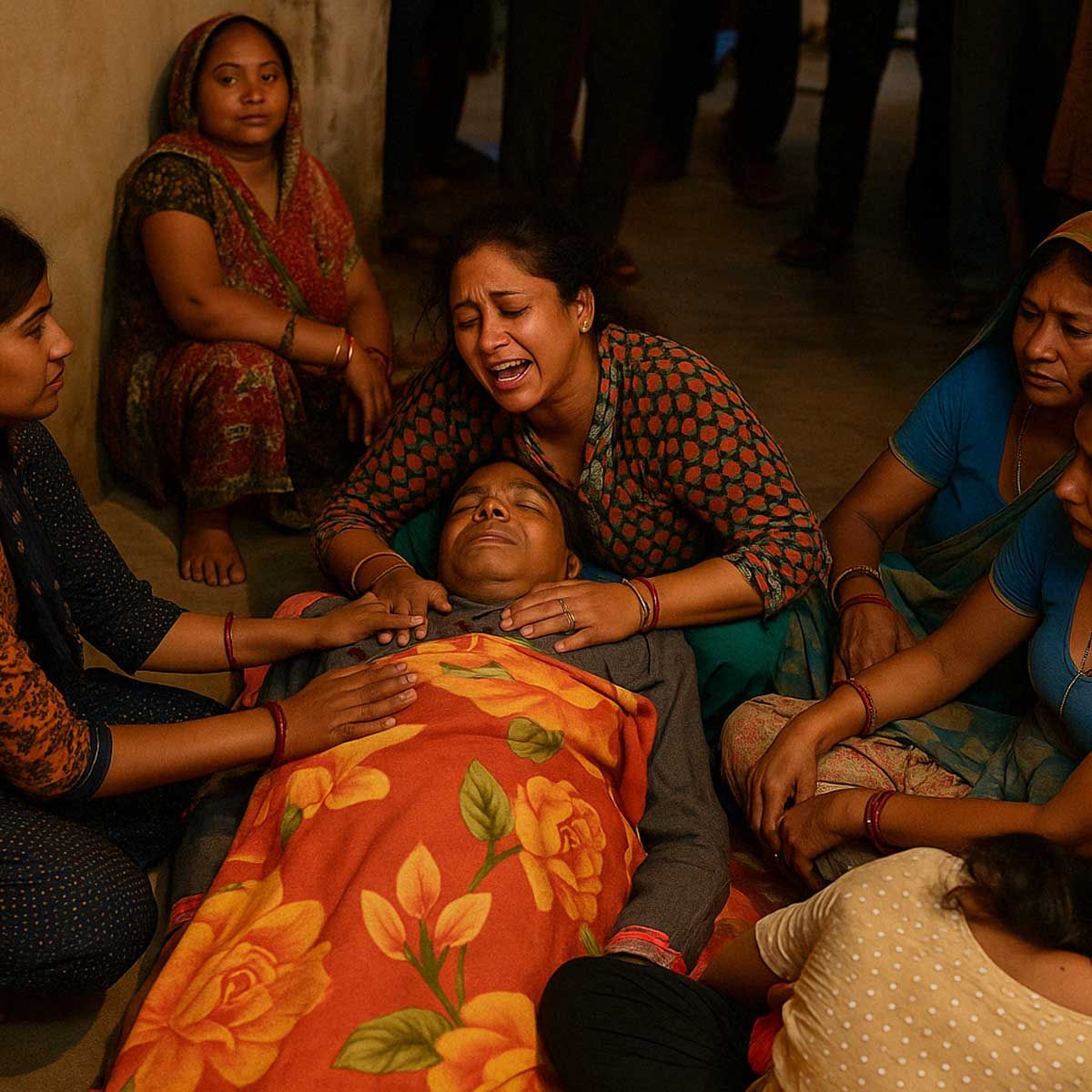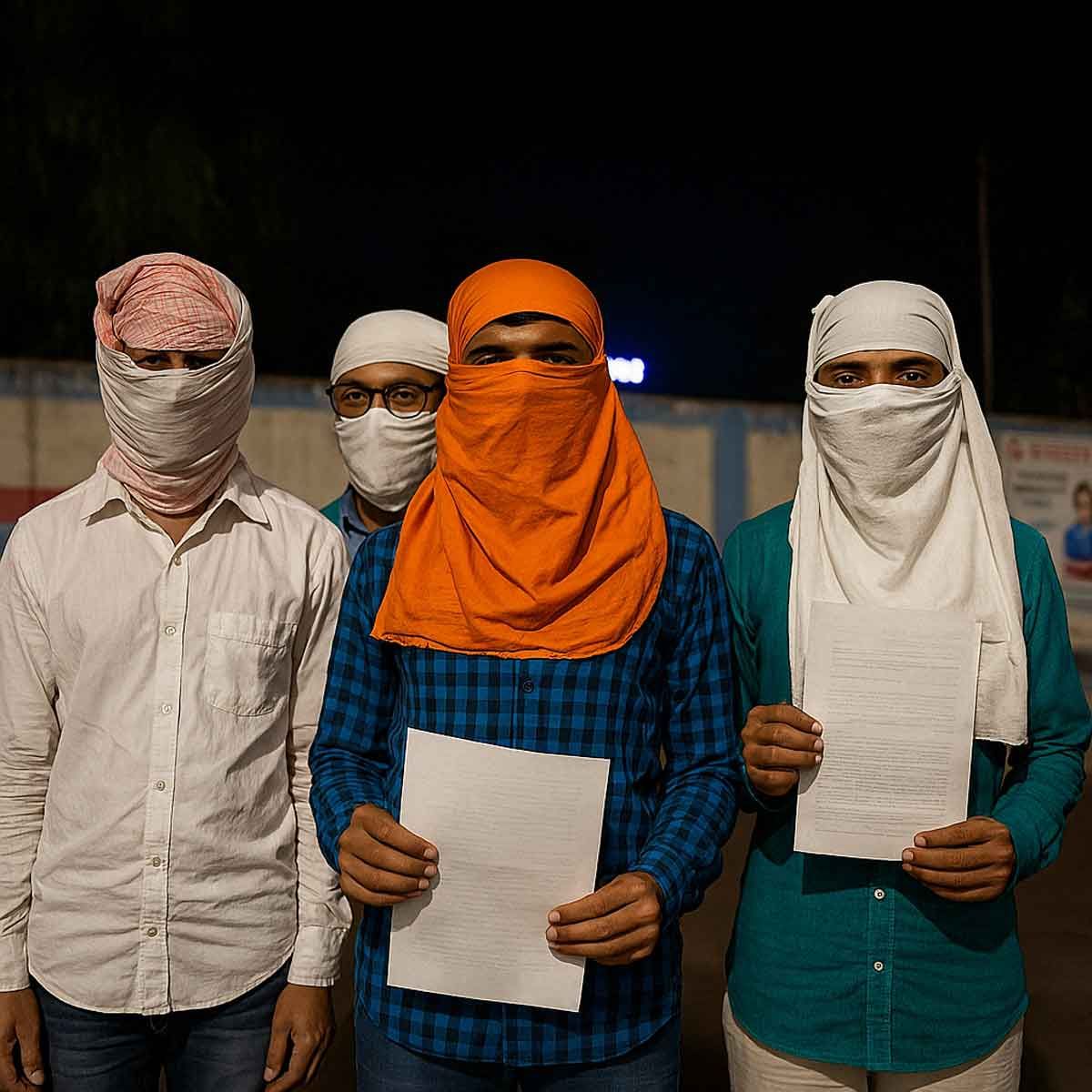More Coverage
Twitter Coverage
Satyaagrah
Written on
Satyaagrah
Written on
Satyaagrah
Written on
Satyaagrah
Written on
Satyaagrah
Written on
JOIN SATYAAGRAH SOCIAL MEDIA
"Son, the greatest trick the Devil pulled was convincing the world there was only one of him": Pune girl Sayali aka Shikha Kale (27) after losing her job during COVID made Tinder and Bumble her ATM, drugged and robbed 16 dates before being arrested

*Amit met Shikha at a popular cafe in Pune in December 2020. The first wave of the coronavirus pandemic seemed to be on the wane and after the long lockdowns, Amit, a university student in his early twenties, was desperate to go out and meet people. He and Shikha had 'matched' on Bumble a few days ago, and unlike a lot of other matches who go days without speaking, or never meeting, Shikha seemed curious and polite.
|
At the cafe, Amit spoke about the movies he liked and Shikha showed keen interest in everything that he had to say. However, she didn't say a lot about herself, Amit noticed. As the evening wore on, Amit asked Shikha if they should order more food. To his surprise, Shikha said she'd rather have dinner in the comfort of a home – perhaps Amit's home would be a good idea, she asked. While driving back to his home, 20 kilometers from the cafe, Amit felt thirsty and Shikha offered him water from a bottle she had brought with her. The water tasted a little weird, but Amit ignored it.
Once home, they ordered dinner and once they started eating, Amit started feeling dizzy. After a while, he felt like he couldn't sit up anymore, so he excused himself and went to his bedroom.
He blacked out soon after.
A few hours later, around 10:45 pm, Amit woke up to the noise of incessant knocking. Still groggy, he went to open the door and saw Shikha rush to the washroom. It was Amit's friend who'd come over to borrow something. The friend was at the door for a few minutes and all this while, Shikha stayed inside the bathroom. She only came out after Amit's friend left and requested him to drop her at a place where it will be easy to find public transport back home.
Amit was still somewhat drowsy but assumed it was something, but he drove four kilometers to a spot Shikha suggested and then returned home. Once home, Amit started to look for his phone — it was nowhere to be found.
And then he realized the two gold rings and a gold chain he was wearing had also gone missing. It took a while for the truth to sink in – Amit had been robbed by his Bumble date.
The First Clue
When constable Prashant Said from Pimpri Chinchwad police station called Amit, it had been a month since he had been robbed, and had very little information about Shikha. In fact, immediately after the incident, Amit was reluctant to even file a complaint but did so at his father's behest.
Said and assistant police inspector (API) Ambarish Deshmukh, both attached to the crime branch of the Pimpri Chinchwad police commissioner, were going through a list of unsolved cases when they stumbled upon a case of a man who was robbed by a woman he had met through a dating app. "It seemed like an interesting case," Deshmukh told Decode, confessing that their unit had busted narcotics gangs and caught murderers, but none of them had ever heard of Bumble before.
They had heard of dating apps, but the name Bumble drew a blank from all the members of the unit Crime Branch. So they got down to researching the app – and the only way to get an understanding of how the woman operated, was to create a profile on the app.
Said and Deshmukh was the first to create their own profiles on Bumble.
Deshmukh, a muscular man in his 30s, a little over five feet five inches tall, uploaded one photo of him in a shirt and trousers, like the ones he usually wears when he does his rounds in plainclothes. Said, a tall, broad-shouldered man, who uploaded a photo of him wearing a casual shirt and denim.
Till then they had very little to work with, the victim knew the woman to be 'Shikha' which the policemen were sure was a fake name. Thankfully they had a photo, a screenshot Amit had taken of Shikha's profile which had gotten saved on Google Photos. In the photo was a short, plump woman with a broad smile. Shikha was in a pair of jeans and a casual red top, her short hair neatly combed with a side parting.
She seemed friendly and likable.
Said and Deshmukh spent a few days scouring through profiles, looking for the accused. And after swiping left on at least a hundred profiles each, they found the woman. She still went by Shikha on the app and had the same picture Amit had screenshotted. The men swiped right on Shikha and waited, a few hours and then a couple of days. Shikha did not swipe on them – there was no match. The profiles the policemen had created of themselves had one photo and no bio and they soon realised, they might be too 'plain' to spark the accused's interest.
It had been almost a week since they had started working on the case and there were next to no leads, still. The cops had written to Bumble, but there was radio silence from the app's management. Shikha had only interacted with Amit over Bumble, so there was no question of tracking her phone.
Decode reached out to Bumble for a comment, however, they haven't responded yet.
While driving back to his home, 20 kilometers from the cafe, Amit felt thirsty and Shikha offered him water from a bottle she had brought with her. The water tasted a little weird, but Amit ignored it.
Then, Said and Deshmukh came up with a plan.
The policemen spent the next few days making a list of their informers who wore 'flashy' clothes and gold in real life and posted those photos on social media.
In their 20s, most of these informers have been known to either Deshmukh or Said for years, convincing them to give their photographs wasn't a task. In the Pimpri Chinchwad region, where the crime branch unit is located, it is not very difficult to come across men who flaunt their gold jewelry. In fact, the region is known for over a dozen 'goldmen', who wear jewelry in kilos and even paint their cars in gold. The local media regularly features these men, often photographed in gold chains and necklaces.
"We deduced from our earlier experiment that she went for wealthy men. Since she stole ornaments, we thought she might go for men who flaunt their jewelry on the platform. All the new profiles that we created had men wearing a lot of ornaments," Deshmukh told Decode.
Of the four profiles that were created, the woman, still called 'Shikha', swiped right on one. The man she swiped right on was an informer in his mid-30s, and the photo showed him wearing multiple gold chains, rings, and a thick gold bracelet.
Said and Deshmukh felt relief – they felt they finally had a lead.
But their excitement was short-lived. Once they got a 'match' they realized that unless the woman initiates a conversation, there was no way they could contact her.
"We learned that if within 24 hours, she does not do so then the male partner can extend the countdown timer by paying a small fee. We paid a nominal sum for the next three days on the fake profile she had swiped right hoping that she would take the bait. But she did not. We were back to square one," said Deshmukh.
They had hit a dead end, again.
|
A New Turn And Again, A Dead End
Said and Deshmukh were not the only ones working on the case. During the course of the investigation, they found that the local police station and another crime branch unit were also trying to crack the case. Not a single station had made any headway on the case.
They then decided to take a more conventional approach to the case.
They decided to check the cell phone data of the users who were active at the locations where the victim had met the accused. "We called another crime branch unit working on the case and they revealed that they had already got the 'dump data' of the mobile phone users, but had made no progress in weeks. The Cyber Crime cell of the branch had also written to Bumble seeking information about the profile, but were yet to hear from the dating app," added Deshmukh.
By now, Deshmukh and Said were sure that they might not be dealing with a seasoned criminal with a history, but the accused was extremely sharp and operated very cautiously, making use of the dating apps' safety features to stay under the radar.
They toyed with settings of age, location, and dating preferences that Bumble offers to help filter prospective matches.
They kept swiping on profiles, a few dozen every days as a routine on Bumble, till they stumbled upon another profile of the accused. This new profile had a different name with the photo of the accused and her profile bio said said 'Lesbian'.
So they decided to create another profile – this time they roped in another informer. The cops described the profile as a "sober looking, not so flashy guy, with the sexual orientation of bisexual". They then changed the partner search settings to looking for 'everyone' on Bumble – one that allows you to browse through profiles of users of all kinds of partner preferences.
In the Pimpri Chinchwad region, where the crime branch unit is located, it is not very difficult to come across men who flaunt their gold jewelry. In fact, the region is known for over a dozen 'goldmen', who wear jewelry in kilos and even paint their cars in gold. The local media regularly features these men, often photographed in gold chains and necklaces.
This profile right-swiped on the accused's second profile. The accused also right-swiped and to their relief, initiated conversation as well.
The conversation began with a few pleasantries. However, the cops were getting impatient and asked the woman if she'd be interested in meeting, and talking over the phone or WhatsApp. To their surprise, she was quick to share her number. It took just a few hours for the cops to figure out that the number she had given them was a fake one. They asked about the 'incorrect number' on Bumble, from the fake profile, a few times. By then, 'Shikha' had stopped talking to the match and showed no interest in meeting either.
Deshmukh and Said had been at it for almost a month and hadn't gotten anywhere close to cracking the case. They still did not know much about the victim, including her real name.
|
A Personal Tragedy And A Breakthrough
In all this, Deshmukh's father passed away and he had to go to his hometown in Amravati, a small town in Maharashtra, to perform the last rites. This was on January 11, 2021.
A week later, Deshmukh received a call from a batchmate from college who sought help with a 'private matter'.
*Prasad, a married friend of his, was robbed by a woman he had met on a dating app. The two had 'matched' on the app and were supposed to meet at a hotel on a Mumbai-Pune highway and spend a day together.
"The modus operandi matched with our accused. I asked my batchmate to first send me a photograph of the woman and then connect me to the victim," said Deshmukh. The friend sent Deshmukh the photo within minutes of disconnecting the call. It was the same woman and she called herself Shikha again.
Constable Said spoke to Prasad and the case felt like a clone of Amit's. The Chennai-based 30-year-old career and education counselor had met Shikha on Bumble when he was in Pune for meetings. They met at the hotel's coffee shop and Shikha soon suggested they take the conversation to a room. They went to the room that Prasad had already booked for himself. As is mandatory for all visitors, the hotel asked for identity proof of the lady accompanying Prasad before letting them through. After entering the room, Shikha offered Prasad a sip from a bottle of cold drink – the man couldn't place if she had been carrying the bottle from before or had ordered it in the hotel itself.
Soon after he drank from the bottle, he started feeling dizzy and passed out on the bed within minutes. "I woke up only the next day. When I woke up, a gold chain worth Rs 90,000, a gold ring worth Rs 25,000, my mobile phone worth Rs 20,000 and the 15,000 rupees I had in cash was gone," Prasad told Said. Shikha had made off with nearly Rs 1.5 lakhs worth of valuables.
Said and Deshmukh felt like they finally had Shikha – she had to have submitted identification proof at the hotel to get up to the room. Only, Shikha was prepared for this as well.
Constable Prashant Said and assistant police inspector Ambarish Deshmukh along with their team at a press conference on the case.
The copy of her Aadhaar card that the hotel had was not Shikha's and belonged to another woman who lived in another town in Maharashtra. The photograph did not match the accused's either, but the hotel had not checked because they found nothing 'suspicious' about the couple.
But it was still a lead. While the cops wondered if the card was stolen from someone, there was a fair chance the person with the Aadhaar card knew the accused.
The Ex
Said and Deshmukh traced the woman, a photographer in her late 20s, in another town, 200 kilometers away from Pune. At first, the woman refused to identify Shikha and said she did not know how the accused had her Aadhaar card. However, after the men started asking her more specific questions, she gave in.
The woman revealed that she had been in a relationship with the accused for three years, a few years ago, and lived together in Pune. After they broke up, the photographer packed her bags and moved back to her hometown. And her real name was not Shikha, or any of the other aliases, it was Sayali.
"The woman told us that Sayali used to ill-treat her and at times, hit her as well. Tired of her behaviour, the woman broke up with Sayali years ago and had not been in touch with her since then. She claimed that the accused took her camera and some important documents as well," Deshmukh said.
And Then, A Mistake
Though the cops now had a little more insight into the accused's life, they were far from being close to nabbing her. The photographer had never gone to Sayali's family home and did not have any valuable information that could help the cops track the accused. However, the last victim they had been speaking to was convinced Sayali had spoken to him over a phone call.
This was new for the police. Till now, for all the victim, Sayali had only spoken to them over the call feature offered by Bumble. So if two people have matched and have Bumble installed, they can call each other through the app itself. This way users don't have to share phone numbers to call and talk to each other.
Soon after he drank from the bottle, he started feeling dizzy and passed out on the bed within minutes. "I woke up only the next day. When I woke up, a gold chain worth Rs 90,000, a gold ring worth Rs 25,000, my mobile phone worth Rs 20,000 and the 15,000 rupees I had in cash was gone," Prasad told Said. Shikha had made off with nearly Rs 1.5 lakhs worth of valuables.
"We would have cracked the case days ago had we got her cell phone number. But she was not careless or stupid to use phone calls which can be easily traced," narrated Constable Said. All this while, Bumble, offered next to no help, and the emails went unanswered.
Armed with fresh information, Constable Said went on to analyze the new victim's call records. After several hours of poring over the data, the cop could not find a call from the accused around the time the victim claimed he had received a call from her. "The victim was confused between a regular call and calls he had received using the Bumble app. We had hit a blank yet again," said Constable Said.
Said, a resident of Pune in his 30s, is a constable but over the past few years had taken a deep interest in cyber crimes. More and more complaints, Said had noticed, were in some way or the other related to technology. And knowing how algorithms worked and the basics of information technology could help, he felt. Said has spent most of his 10 years in the force in the crime branch and said he picked up most of his investigating skills watching senior detectives work cases.
So he sat down with the victim's cell phone records once more and went over the data carefully, looking at each phone number and tracing it back to the source. None of the calls made at the time the victim remembers speaking to Sayali threw up any leads.
A day later, he finally had a breakthrough. Said spotted a seven-second call made to the victim's number, at a time the man was convinced he had not spoken to Sayali. However, he couldn't place the call or the number. Said could have picked up the phone and dialed the number, but instead, he decided to get details of the number from the service provider. While he waited for the details from the mobile phone company, Said had a recollection — he had seen this number somewhere else.
He quickly rummaged through the pile of paperwork on his desk and there it was – the number the victim had received the 'mysterious' call from, was just a digit different from the number Sayali had shared with the fake profile the cops had put up.
Sayali, finally, slipped up. And Said caught it.
"I had a hunch when I saw that number on the call data records. It seemed familiar and yet I couldn't place it instantly," Said explained. He added that in his line of work, they are constantly going over vehicle numbers or cell phone numbers of the persons of interest. And sometimes, Said just memorizes them. For example, he told Decode, for a case they were working on at this time, he has the vehicle number by heart in case he spots it on the road.
"The victim could not recount having spoken to the accused at that particular time. All he could recount as having received a call at that hour but being unable to hear the other side. She must have dialed on a regular phone call by mistake and disconnected immediately after realizing her mistake," explained Said.
Things fell into place pretty quickly afterward. The cell phone provider gave the cops the address to which the postpaid number was registered and the cops did a stakeout at the location to confirm it was indeed where Sayali lived.
After a few hours, Said spotted the accused leaving the building on a scooter as a pillion rider. The cops returned the next day with their female counterparts, as is mandatory to arrest a female accused, and arrested Sayali from her residence.
One Woman, 16 Victims
Twenty-seven-year-old Sayali dropped out of college and then spent her time taking up odd jobs in call centers and customer service companies. She lived with her mother and brother on the top floor of an apartment building in an upper middle class, quaint neighbourhood in Pune. What the cops found odd though is that hers wasn't a typical flat. The family had occupied the top floor of the building and constructed rooms haphazardly. "We didn't get into the details of that. All we could figure was that there was some kind of property dispute because of which the family had constructed random rooms on the terrace and used them as their house," Said told Decode.
Twenty-seven-year-old Sayali dropped out of college and then spent her time taking up odd jobs in call centers and customer service companies.
Theirs was a non-intrusive, private family and some of the neighbors and shopkeepers who had lived in the locality for years struggled to place who Sayali was when this correspondent spoke to them. Some of them remembered that Sayali's father was a doctor and had passed away from a sudden heart attack 10 years ago. Sayali's brother too worked at a call center.
Decode attempted to get in touch with her family and lawyers, but they were not willing to speak on the case.
As the Covid-19 pandemic unfolded in India, Sayali lost her job at the call center of a mobile phone network provider. However, she did not tell her family about it. Her mother, the police said, had started developing mental health issues after her father passed and was prescribed several medications – some of them being sleeping pills of medium strength. Sayali used her mother's prescription to buy those pills and then drug her dates with them.
Some of these drugs were Schedule H drugs that couldn't be bought without following protocol. The chemists have to stamp prescriptions with quantity and date of purchase every time they are purchased.
"She was well aware of how the system works. She used to frequent a chemist near General Post Office in Pune, who knew that her mother was suffering from depression. Since she was a regular, he did not stamp the prescription, which she used repeatedly to buy sedatives to spike drinks of her victims," said API Deshmukh.
In the course of the interrogations, Sayali revealed that she usually targeted married men or educated single men. Both these groups of men, she assumed, would be too embarrassed to report the crime to the police. And she was right.
In the course of the interrogations, Sayali revealed that she usually targeted married men or educated single men. Both these groups of men, she assumed, would be too embarrassed to report the crime to the police. And she was right.
The cops identified 16 instances where Sayali had met men from Bumble and robbed them and the police were unable to convince all the victims to come forward and lodge complaints. After her arrest, Sayali was initially reluctant to give details of her victims. Said and Deshmukh had closely studied her call records. They identified dates on which she was in one place for several hours. They eliminated her home address. "We deduced that if she was in one place for several hours, then she was on a hunt. When she refused to cooperate and divulge details of other victims, we were confronted with the location data we had gathered. That is when she knew that her game was over and started singing like a canary," said Deshmukh.
She agreed to take them to addresses where she had met her victims.
In one case, the cops, accompanied by Sayali, turned up at a swanky house in Koregaon Park – a posh locality in Pune inhabited by some of the wealthiest residents of the city. The accused had told the police she had robbed a man who lived at the address.
"We rang the bell and a woman opened the door. She had no clue who Sayali was. A few feet behind the woman, a man in pajamas and a t-shirt was standing, looking a bit perplexed. He refused to come forward or speak to us. The moment Sayali took one look at the man, she confirmed he was one of her victims. No amount of persuasion could compel the man to even acknowledge he knew Sayali, let alone lodge a complaint to strengthen the case," Said said. In some other cases, the police found that the men had vacated the apartments and left.
"We still have unclaimed valuables of at least 12 victims lying in police station's custody," said Deshmukh. So far only four victims have come forward.
"Sayali chose men carefully. She only met the men she realised would not have the courage to ever go to the cop station and report a crime. Our first victim, even though was a single man, did not want to register a crime. It was only at his father's insistence that he approached the police station in December 2020. His father strongly believed that he should not let go of such a serious crime wherein he had been drugged with a huge dose of sedatives," explained Deshmukh.
Sayali also provided the cops with another curious detail. The names she used in her multiple profiles were of her friends from her real life.
While on one hand she meticulously planned her 'dates', on the other, she found a jeweler in a corner of Pune far away from her home. She posed as a young woman hailing from a wealthy family, selling off their valuables to fund the treatment of her ailing father.
"The jeweler had bought her story. Apart from stolen jewelry, she had even sold a silver idol she had stolen from her friend's house. We have recorded statements of some of her friends and their families stating that she had stolen from their houses much before she started looting people using dating apps," said Deshmukh.
The police have recovered a large part of the stolen items from her residence and from the jeweler. Even the phone she was using, cops claim, was stolen from a friend's house where she had gone for a function.
|
The Cops Who Cracked The Case
Once the police had her in her custody, the then Pimpri Chinchwad police chief Krishna Prakash held a press conference urging victims to come forward. But not many did.
Said and Deshmukh, both in their 30s, are quick to compliment each other on the success of the case. During a critical period of cracking the case, Deshmukh was grieving the loss of his father and said, constable Said had his back. "Said is the best resource we have to study data dumps," Deshmukh told Decode.
He quickly rummaged through the pile of paperwork on his desk and there it was – the number the victim had received the 'mysterious' call from, was just a digit different from the number Sayali had shared with the fake profile the cops had put up.
Sayali, finally, slipped up. And Said caught it.
The constable on the other hand was sure that had it not been for the assistant inspector's inquisitiveness and attention to detail, they'd not be on the case in the first place.
Despite having been a cop for over 10 years, Sayali's confessions after she was in custody took them by surprise. Sayali was never in a hurry to pick up the loot and escape – instead, she took time to relish her work. After Prasad passed out in the hotel room, Sayali told the policemen later, she had a few drinks from the mini bar, smoked a joint she was carrying with her, collected Prasad's items and cash, and then left.
"The sheer confidence! We were taken aback!" Deshmukh exclaimed.
References:
 Support Us
Support Us
Satyagraha was born from the heart of our land, with an undying aim to unveil the true essence of Bharat. It seeks to illuminate the hidden tales of our valiant freedom fighters and the rich chronicles that haven't yet sung their complete melody in the mainstream.
While platforms like NDTV and 'The Wire' effortlessly garner funds under the banner of safeguarding democracy, we at Satyagraha walk a different path. Our strength and resonance come from you. In this journey to weave a stronger Bharat, every little contribution amplifies our voice. Let's come together, contribute as you can, and champion the true spirit of our nation.
 |  |  |
| ICICI Bank of Satyaagrah | Razorpay Bank of Satyaagrah | PayPal Bank of Satyaagrah - For International Payments |
If all above doesn't work, then try the LINK below:
Please share the article on other platforms
DISCLAIMER: The author is solely responsible for the views expressed in this article. The author carries the responsibility for citing and/or licensing of images utilized within the text. The website also frequently uses non-commercial images for representational purposes only in line with the article. We are not responsible for the authenticity of such images. If some images have a copyright issue, we request the person/entity to contact us at This email address is being protected from spambots. You need JavaScript enabled to view it. and we will take the necessary actions to resolve the issue.
Related Articles
- "I trust you": In Punjab, a gym owner's dream of a safe future for his family was cruelly shattered when, upon returning from Qatar, he was shot in his sleep; his life cut short in a piercing betrayal, with his wife arrested for orchestrating the murder
- NCPCR sought an explanation over 824 out of 1,027 Govt schools not having principal: AAP leaders, including CM Arvind Kejriwal, had targeted Gujarat schools in view of upcoming state assembly elections
- "फ़ना": Mumbai animator Nishant Tripathi found dead in a Vile Parle hotel, leaving a suicide note blaming his wife Apoorva Parekh and her aunt Prarthana Mishra; his grieving mother, activist Neelam, calls herself a “living corpse” as police investigate
- "एक चेहरे पर कई चेहरे": 'Nationalist' Aquib Mir, posing as 'Ravi Rajput,' tricked Anna Jain, forced her into a nikah, looted her of 50 lakhs, and beat her daily to wear a hijab; publicly claims secular while privately enforcing strict Islamic practices
- "Trust dies but mistrust blossoms": PowerPoint to Potatoes, why Bill Gates buying so much land, billionaire owns majority of US farmland, 895+ million acres of farmland in the country, so miraculously he actually has less than 1% of the country’s total
- Kerala Gold smuggling case: Co-accused PS Sarith abducted by few unknown persons from Swapna Suresh's home on Wednesday morning just minutes after explosive revelations in press conference
- "अलविदा": In Shahjahanpur, Uttar Pradesh, after murdering her husband Satyapal with a brick, wife Gayatri was seen gruesomely manipulating his shattered skull & discarding flesh, a shocking sight that left onlookers horrified & sparked widespread outrage
- "There are three things in the world that deserve no mercy, hypocrisy, fraud, and tyranny": Merchant Ishaq Ibrahim mysteriously disappeared from HP after purchasing apples from the arhtiyas worth Rs 2 crore and sending them all away, farmers conned
- Gender Biased Indian Law: Delhi High Court observed that in India, expenditure borne by brother in supporting his divorced sister must be taken into account while passing an order of maintenance in favour of his wife
- "If you see fraud and do not say fraud, you are a fraud": Systemic deficiency and the nexus between police, passport agents and passport officials come to light with Tamil Nadu BJP President K Annamalai going hammer and tongs about ‘Fake Passport Scam'
- "What a sad era when it is easier to smash an atom than a prejudice": Supreme Court declines to entertain PIL for creation of National Commission for Men to look into suicides among married men, says "No question of misplaced sympathy for anyone"
- "In every empire's fall, a lesson is whispered": The enigmatic tale of Subrata Roy and the Sahara Empire, from ambitious business ventures to the infamous Rs 24,000 crore scam and the decisive steps towards redressal and justice for millions of investors
- Same Congress which is offering freebies in the states during polls has not paid rent for Lutyens Delhi bungalows for almost a decade, Rent worth crores pending: RTI revelation
- Sonam Wangchuk, after attending Pakistan's climate conference hosted by Dawn Media, led Pune protests against the Riverfront project, previously insulted Lord Ram and Mata Sita, opposed Ladakh's army construction and faced backlash for anti-India activism
- Sehaj Arora, Kulhad Pizza owner, confronts a damaging video, pleading with the public over the trauma inflicted on his family, as accusation of AI morphing arise, Jalandhar police pinpoint a revenge-driven ex-employee, Soniya, behind the alleged blackmail




























